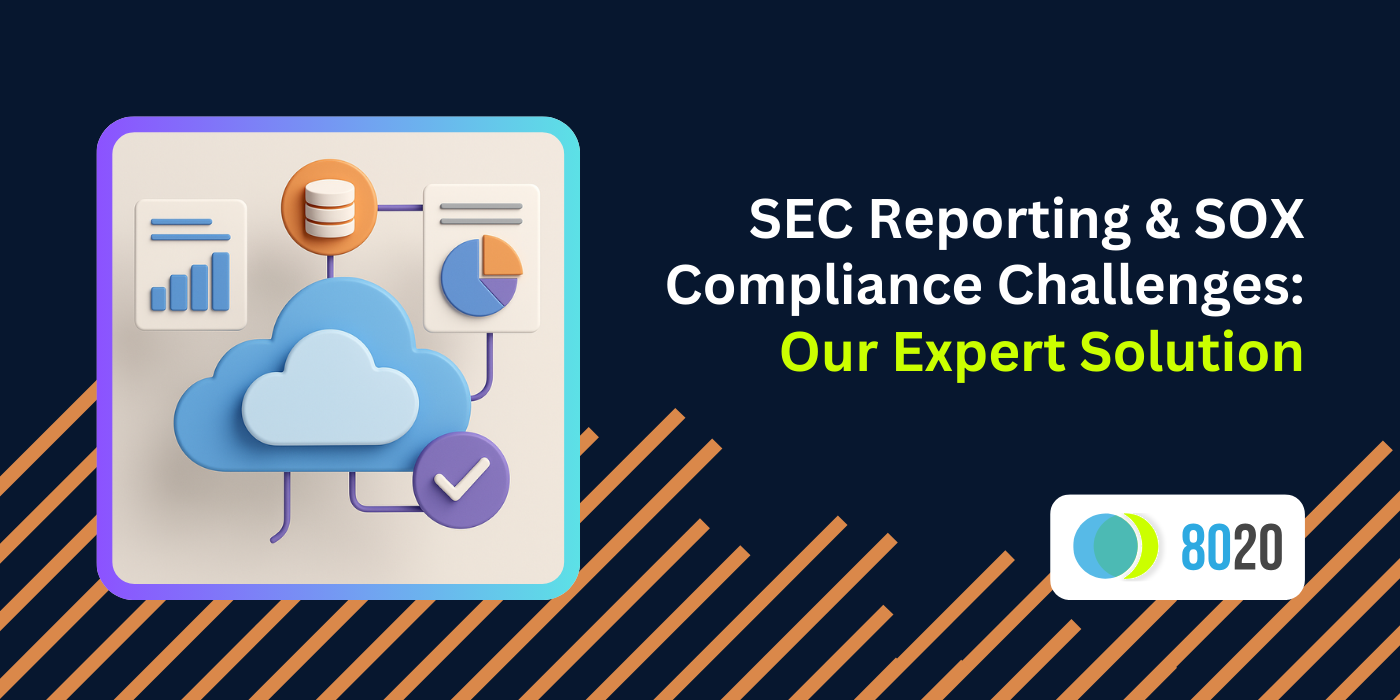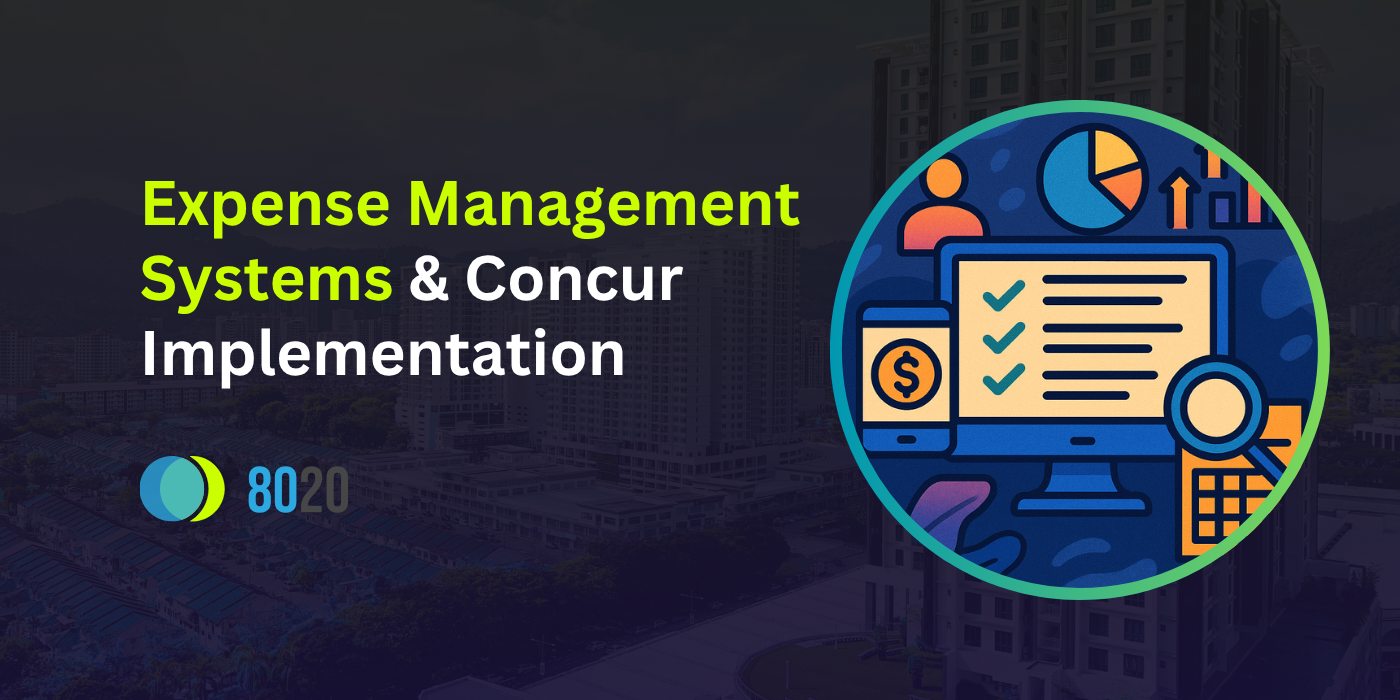Financial Reporting and Accounting Services
Turn Financial Reporting Into Strategic Business Insight
8020 Consulting deploys experienced financial reporting and accounting professionals who go beyond compliance to uncover the story behind your numbers. We optimize reporting processes to deliver accurate, actionable insights that improve operational efficiency, enhance profitability, and strengthen executive decision-making.
TRUSTED BY INDUSTRY LEADERS






Accelerate Financial Performance Through Precision Reporting
Our Financial Reporting and Accounting Services are built to deliver more than just compliance. 8020 consultants streamline monthly close processes, enhance the accuracy of financial statements, and establish KPI frameworks that align reporting with strategic business goals. We design scalable reporting infrastructures and accounting workflows that improve decision-making and support long-term growth — all while ensuring audit readiness and regulatory alignment.
20+Years
Avg. Operator Experience
100+
Full-Time Consultants
12+
Years in Business
1,600+
Projects Completed

How Is 8020 Different? How Our Financial Reporting and Accounting Services Stand Out
When accuracy, compliance, and visibility are critical, 8020 Consulting delivers senior-level accounting and reporting professionals who bring structure, precision, and strategic insight to your finance function. We quickly assess your current environment, identify gaps, and implement best practices that improve data integrity and reporting performance.
Why Companies Trust 8020:
• Fast deployment of seasoned finance professionals with Big-4 and F500 credentials
• Proven diagnostic approach to assess team structure, reporting, and systems
• Proven success in high-stakes audits, carve-outs, and transitions
What Our Financial Reporting and Accounting Services Deliver:
• Faster, more accurate monthly, quarterly, and annual financial closes
• Transparent, audit-ready financial statements and reconciliations
• Scalable reporting infrastructure tailored to your growth
Financial Reporting & Accounting Services Benefits
When financial accuracy and compliance are on the line, delays can lead to costly setbacks. Our consultants move quickly to stabilize reporting processes, strengthen internal controls, and deliver the timely financial insight needed to support confident decisions and meet critical deadlines.
01
Identify Financial Growth Opportunities
Every growth strategy starts with understanding key financial and operational drivers. Our intellectually curious Consultants leverage 20+ years of FP&A experience alongside sophisticated forecasting models to identify revenue opportunities and optimize profit margins.
02
Dynamic Models for Decision-Making
Business decisions require real-time visibility and scenario planning capabilities. We build financial models and interactive dashboards that enable confident decisions through clear metrics and industry benchmarking.
03
Embedded Expertise That Gets Things Done
Successful FP&A demands seamless integration from daily operations to board-level strategy. Our consultants help lead all critical processes while training your team on advanced financial modeling and analysis for lasting improvement.
04
Deliver Impact Quickly, At Every Level
FP&A excellence spans the complete value stream from daily metrics to long-term planning. We implement proven practices and enhanced KPI tracking to build a strong foundation for sustainable growth.
How Our Financial Reporting & Accounting Services Help
Our consultants have deep expertise in many different Financial Reporting & Accounting Services. Read more about some of the other resources we offer:
We Operate Differently | We’re Built On Successful Outcomes, Not Just Theory
Our proven consulting model sets us apart from the market. Our core operating directives below make us different, better.

"8020 was crucial for RealD in developing a financial model for technology IP monetization and guiding our ERP selection process. Their work is thorough, executive-ready, and their team effectively implements recommendations."
⭐⭐⭐⭐⭐ | Jeff Spain | CFO, ReaID

"8020 was key in overhauling our budgeting process at 72andSunny and provided crucial support for system implementations like Workday and Oracle."
⭐⭐⭐⭐⭐ | Jordan Toplitsky | CFO, 72andSunny

"The team at 8020 have supported me across three companies, including managing our NetSuite implementation at Edgecast, integrating billing systems post-acquisition by Verizon, and overseeing our HQ relocation."
⭐⭐⭐⭐⭐ | John Powers | CFO, Tithe.ly

"8020's consultant brought a proactive approach to every challenge, consistently exceeding expectations while strengthening our team dynamic. I highly recommend 8020 for their skilled professionals who deliver immediate value and elevate any team."
⭐⭐⭐⭐⭐ | Lindsay Terifay | VP, Controller - Fandango & NBC Sports
Meet Some of Our Experts
All the right skills, real-world experience, & high EQ leadership to ensure your success.
Financial Reporting & Accounting Resources
Access some of the powerful service-specific resources below to help you level up & win.

Accounting Department Health Check
Dive into 12 core disciplines of high-functioning accounting departments including behaviors, processes and optimization

Improve Your Month-End Close (Infographic)
Learn 5 things you can do to speed up month-end-close, prepare timely financials, and make business decisions.

Accounting Process Improvement Strategy Guide
Get our guide to ESOAR methodology for streamlining accounting processes, featuring a case study on improving Sales Returns provisioning

Our Promise to You
The 8020 Commitment
We’re committed to delivering meaningful impact, fast.
Our consultants bring the expertise and focus to create measurable value from day one. And if expectations aren’t met, we don’t stand still, we collaborate, adjust, and ensure we deliver on the value we promised.
Financial Reporting & Accounting FAQs
Answers to your most frequently asked questions
How is 8020's Consulting model different from other firms?
Unlike traditional firms that rely on junior teams or contractors, we embed highly experienced operators directly onto your team.
Our consultants are chosen from the top 10% of the market and are our full-time employees who combine deep technical expertise with hands-on operational experience, averaging 20+ years in the field.
This means you get the perfectly chosen expert for your specific needs, who operates as an extension of your team, drives immediate results, and elevates your entire finance operation through their proven methodologies and industry knowledge.
What makes your consultants different from other firms' consultants?
We exclusively hire senior finance professionals who have both led and executed complex financial operations in many real-world scenarios.
Each consultant must demonstrate exceptional technical expertise, strategic thinking, and a proven track record of success across challenging business environments.
Our consultants have actually "sat in the seat" - meaning they've held senior finance positions and truly understand the day-to-day challenges of running finance operations. This combination of technical knowledge and practical experience matched to your specific challenges enables them to deliver superior results.
How do you match consultants to specific client needs?
Our leadership & Client Services teams are made up of experienced finance and accounting consultants themselves, so they actually viscerally understand what your challenges are and who's best suited on our team to solve them.
We also use a precise diagnostic approach to match the right expert to your specific challenges by carefully evaluating project requirements, industry context, and technical needs to deploy consultants with directly relevant experience.
Our very selective hiring process maintains a diverse pool of specialists across many finance disciplines, ensuring we can address any financial challenge with the exact expertise needed. While out on a project, each of our consultants can leverage the collective knowledge & experience of all ~100 experts on the team whenever needed.
This strategic matching process, refined over years of successful engagements, maximizes project success and client satisfaction.
What is financial reporting and accounting?
Financial reporting and accounting refer to the processes used to record, organize, and present a company’s financial activities.
Accounting involves capturing and classifying financial transactions, while financial reporting focuses on summarizing this information into statements such as the income statement, balance sheet, and cash flow statement.
These functions provide transparency, support compliance, and help stakeholders make informed business decisions.
When is the right time to bring in outside help for Financial Reporting & Accounting?
The right time to bring in outside help for financial reporting and accounting is when internal resources are stretched, reporting accuracy is at risk, or key initiatives—like audit preparation, system implementation, or close cycle acceleration—require additional expertise. Support is also valuable during periods of growth, compliance changes, or when upgrading reporting processes for greater efficiency and insight.
What is the ideal market for an 8020 operator in financial reporting & accounting?
Our operators work effectively across organizations of all sizes and industries, bringing deep expertise in both technical accounting and strategic reporting.
While we often support companies during periods of growth or transformation, our approach adapts to meet various reporting needs, from streamlining monthly closes to enhancing SEC compliance.
How long does a financial reporting and accounting contract last?
Financial reporting and accounting contracts typically range from 3 to 9 months, depending on the scope of work.
Shorter engagements may focus on month-end close optimization or system implementation, while longer contracts support broader process transformation, compliance upgrades, or audit readiness.
Engagements are structured to deliver sustainable results with flexibility to extend as needed.
What is required before starting financial reporting with 8020 Consulting?
We begin by understanding your current reporting processes and specific challenges.
While having basic financial data available is helpful, our experienced operators can work with various starting points.
Our approach adapts to your organization's existing systems and resources while identifying opportunities for enhancement.
Does 8020 Consulting customize financial reporting for businesses?
Yes, we tailor reporting solutions to align with your specific business needs and strategic objectives.
While we leverage proven best practices, our approach focuses on developing reporting frameworks that make sense for your organization's unique requirements, whether that involves streamlining existing processes or building new capabilities.
How does 8020 Consulting turn financial reporting into actionable insights?
We focus on elevating reporting beyond basic compliance to drive strategic decision-making. This typically involves developing targeted KPIs, enhancing analytics capabilities, and creating clear connections between financial results and operational drivers.
Our approach emphasizes making financial data more accessible and meaningful for business leaders.
Additional Deep Learning
Read any of the related articles below to level up your learning today.
Your Corporate Finance & Accounting Challenges, Solved
Leverage the industry’s most skilled accounting & finance consultants to help you solve any challenge
- Instantly fill your gaps & drive performance
- Extend your team with INsourced experts
- Optimize accounting infrastructure & efficiency
- Save money & get projects done right and on time

.png?width=1200&length=1200&name=Front%20-%20Erika%20Ketz%20(5-14).png)
.png?width=1200&length=1200&name=Front%20-%20Anthony%20Granato%20(5-14).png)

.png?width=1200&length=1200&name=Front%20-%20Federico%20Pulido%20(5-14).png)
.png?width=1200&length=1200&name=Front%20-%20Chona%20Chua%20(5-14).png)


